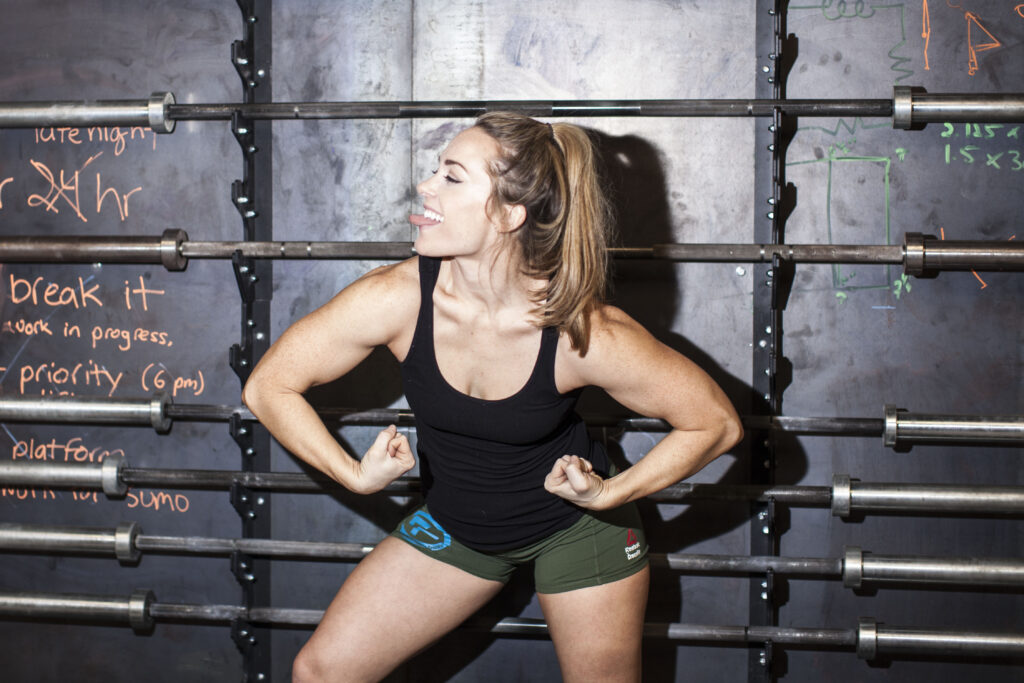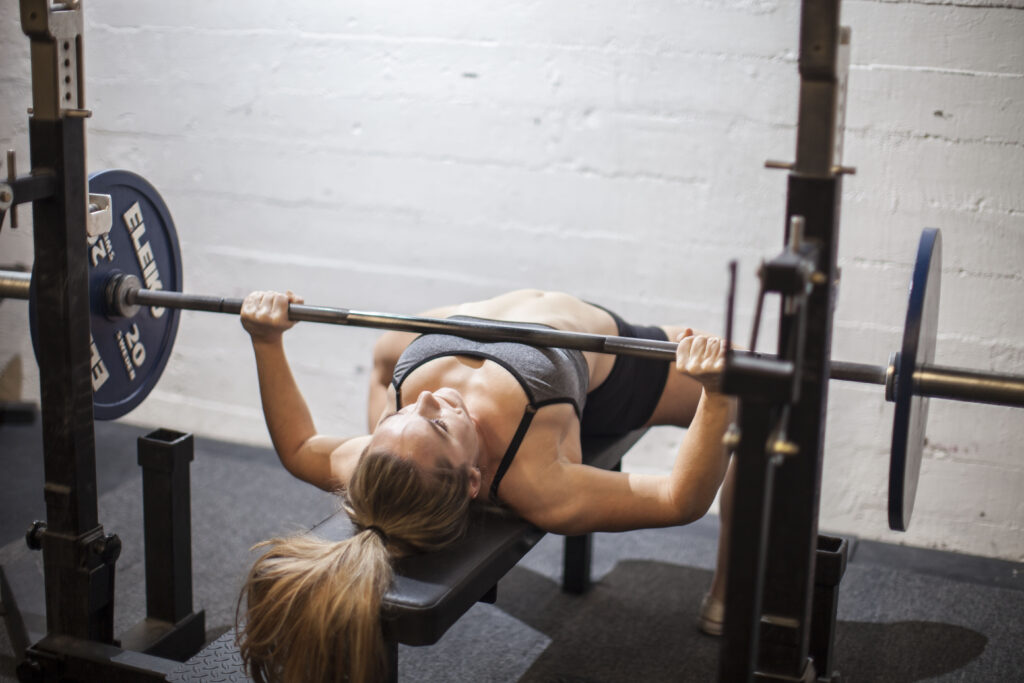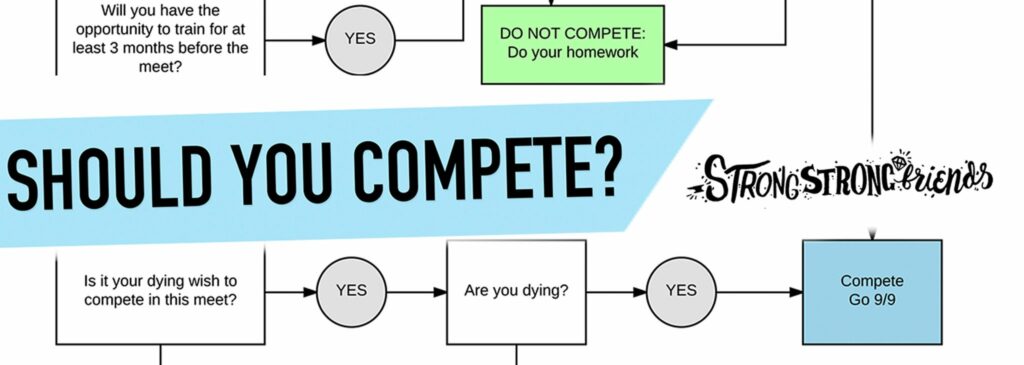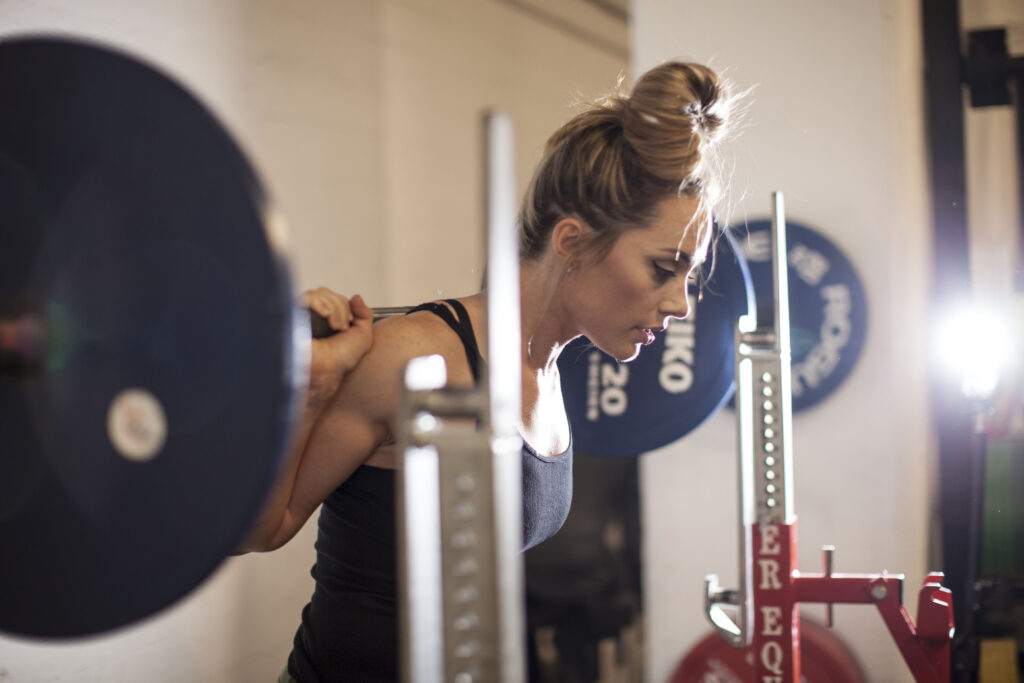You may not know the name Meg Gallagher. But if I asked if you’d heard of @MegSquats, you’d probably give me a different answer.
Meg is a well-known powerlifter and influencer in the strength sports community. What originally started as a YouTube channel documenting her lifting journey has since grown into a business and a personal identity.
She competes, teaches, programs, and works with other professionals to improve other’s lives. One of her driving goals is to share and spread light on the sport of powerlifting. From the moment I met her, I knew Meg was in this industry for all the right reasons.
Earlier this month I had the opportunity to sit down with Meg and talk about…a variety of subjects. We talked about legally changing our names, how to compete and get into powerlifting, what the future holds for her, and so much more. By the end of our interview I felt as though I had truly become one of her many Strong Strong Friends.
On The Name Meg Squats
Jake: First, I have to know…how did you come up with the name Meg Squats?
Meg: The name somewhat came about before I got into powerlifting. I was originally involved in CrossFit. Also, I tried a bikini show, which didn’t workout for me personally – I lost a bunch of weight for the show, but then after ended up rebounding and putting it all back on.
At this point, I just wanted to get back into the gym and begin lifting again, but all I wanted to do was squat. So I ran a Bulgarian program, right after Smolov, so I was literally squatting everyday. I started gaining a little traction on social media for my increase in numbers, so I decided to change my name to Meg Squats.
Jake: So if you were benching all of the time, you would have been Meg Benches?
Meg: Exactly.
Jake: Do you think that would have been better or worse for building a brand?
Meg: Well…I think the problem is, is at the time my squat was really great, but then I cut down a weight class and my squat hasn’t seen the numbers I was squatting originally. When you compare all of my lifts to other competitors, my squat is probably the least competitive. I still enjoy squatting, but my deadlift is way better than my squat.
Jake: So…if I changed my name to Jake Deadlifts, do you think that would be good or bad thing? From a legal point of view.
Meg: I think if you’re passionate enough about something that you want to change your name, then why not? I think we should be whoever we want to be, our name is so ingrained in our identity, yet we don’t have a choice over it.
Editor’s note: I’m still waiting on my mom’s response to the idea of me legally changing my name to Jake Deadlifts.
On The Transition To a Full Time Strength Career
Jake: What did you do before fitness?
Meg: My background is in graphic design. I studied design in college and worked in Washington D.C. after college at a job that worked with Governments Internationally. So I kind of had this secret agent job, where I handled their marketing and communications. It was really cool, I was traveling all over the world to countries I never would have gone to, had I worked somewhere else.
Ryan (my boyfriend) and I then moved to New York when Ryan got a job here. I told the company I was with that I was moving to New York and this is what I’m doing, so they allowed me to work as a consultant for them.
I stayed there working remotely for about a year, and then slowly, I think that the flexibility working as a consultant made it so we could start offering some coaching, create better content, and start to focus on building our brand. Then eventually we began to make more money, so the revenue stream allowed me to no longer have to work. My boyfriend Ryan also works for me, he’s my main consultant on Excel things.
On Working With a Significant Other and Being Strength Nerds
Jake: Do you find it difficult to work with a significant other? Is it hard to separate church from state with business and personal issues?
Meg: I think we’ll figure it out. I’ll have a better answer for you in the next few months. Currently, he works around 80 hours a week at his normal job, so our actual office time is limited. It’s nice because I am the brand, marketing, and communications person, while he is the back end stuff. We work on programming for clients together and it’s very collaborative there. This all started because he began programming for me.
Personally, with my programming, he always gets the last say, because he’s going to push me a little harder than I would myself. In other words, he’s kind of the back end, aka the kind of nerd stuff…I’m the cool stuff, which is great. Plus, we work together very well in our relationship and so far running a business together.
Jake: So does Ryan have a background in fitness?
Meg: Ryan is a weightlifter and he’s been doing so for about four years now. He studied powerlifting a lot, I know in college, he did his thesis on powerlifting, even though he was an economics major. He’s almost a bigger strength nerd than I am. Since I’m a woman, I pay attention to female athletes more closely and those numbers are so much more relative to my own strength, so I can be more interested in them. On the flip side, a lot of the guys, especially old school powerlifters, Ryan will know exactly who they are – for example, he taught me who Paul Anderson was, do you know who that is?
Jake: Actually yes, we’ve written about Anderson. I always find it interesting how older, history oriented pieces do so well, we’ve written about Milo Steinborn, Eugene Sandow, Paul Anderson, and many more.
Meg: That stuff is so interesting, plus you’ll gain more of true, hardcore following creating pieces like that. I recently started a Pinterest board of old school strength inspiration. Whenever I interview athletes, sometimes it takes the spotlight away from me, but I’m also self aware and I understand I’m not always the most interesting person in the world. So interviewing other athletes and covering that, is like paying homage to a sport that is massively growing and also massively changing from what it used to be.
I think it’s important to recognize the history of powerlifting, for example, a lot of raw lifters I know have no idea what equipped lifting is. As an ambassador for the sport, I think it’s almost my responsibility to help educate others about the sport of powerlifting. Also, understanding powerlifting’s roots is super important to me and that’s something I want to keep as a theme in all of the content I create. It’s cool that you guys are writing about that stuff.
On Growing a YouTube Channel and Helping Others
Jake: When you first began making videos, did you ever think they would be to the point where they are now with 99,000+ subscribers and such widespread success?
Meg: I mean…that’s always the hope, you always hope that something will be successful. Although, when I started I had no intentions of leaving my job, I had no intentions of coaching, but it wasn’t until I started making videos and interacting with subscribers that I learned, “Oh, I’m really helping people.” For example, I did a video on, “What To Pack Before a Meet,” and now I meet people in person that express how much it helped them.
The fact that I can help someone prepare for a meet that they’ve spent months in training cycles preparing for is huge to me. And it wasn’t until I really started interacting with people did I realize, “Oh, I want to coach,” and “Oh, this could be something big.” I like talking to people on the internet about lifting, so it was a no brainer to continue making these videos.
Jake: I completely get that. It’s hard to explain that aspect to others outside of the strength industry. I have buddies on Wall Street making a ton of money, and they always question me about training. It’s always the same story, when you genuinely help someone, there are few things that compare to that and I feel like that’s exactly what you just summed up.
Meg: Exactly. The strength community is so small and widespread across the world, especially for women, not every girl has a woman at her gym that’s giving her tips. That’s really huge for me, at my first gym I had a great community and that was key to making me a better lifter and learning to enjoy the process of lifting.
I talk to girls on the internet and they explain how they’re the only girl at their gym or they’re at a commercial gym and no one has even heard of the word powerlifting. So I think I found a gap between something that no one was talking about, which was powerlifting. And powerlifting is cool because you can compete, and for a lot of us that’s an exciting thought. Competing makes me feel like a kid again. It’s awesome because it’s a sport. No one outside of high school and college really plays sports, so it’s nice having something to constantly work towards that isn’t your job.
On Beginning to Compete and Getting Into Powerlifting
Jake: What are two or three tips you would give someone who’s on the cusp of thinking about competing, but are not sure if they’re strong enough to do so? For example, what if I wanted to compete in the spring (something I’m trying to do)?
Meg: I actually have a chart that has questions you should ask yourself before you compete. It’s also in a video and you can download it from my site.
So If you are on the cusp and you’re trying to figure out: Should I compete?
One, if it’s your dying wish, and you are actually dying – just compete. Just do it.
Two, if it’s your dying wish, and you’re not dying right now, I would train for a solid training cycle, maybe 12-weeks, sometimes longer. That’s a powerlifting and competition specific program, by the way. Also, know the rules. Next, I would suggest going to a meet. These are all prerequisites before entering a competition. There are a lot of rules and it can be quite technical. Although, that’s just a big picture to find out if you’re ready to compete, my tips would be…
I don’t want anyone to be discouraged, but there is a little barrier to entry and we should respect the sport.
Tips for you specifically…
1. Don’t cut weight.
2. Go 9 for 9.
3. Have fun.
4. Don’t get too amped – the time before your first squat and last deadlift will be around 4-hours.
On Goal Setting
Jake: From a personal and fitness standpoint, how do you set goals? Do you set short-term, long-term, both, how do you dictate where you’re going next?
Meg: I set both short-term and long-term goals.
Short-term in that, I grade every training session I have everyday. I grade how much fun I had and how accomplished I feel. For me to achieve a 10/10 accomplished grade, I just need to hit the numbers I’m programmed to hit. Which is good, that’s all you really need to do, day in and day out.
Although, there are days when you don’t get to accomplish everything you wanted to, but that’s okay.
Jake: You need those days, they make you appreciate the 10/10 days.
Meg: Completely agree. Long-term, I try to set 3-month, 6-month, 12-month, and 18-month goals, right now I’m not that structured because I just finished a big meet. Usually I’ll have a big meet in mind for a year and the long-term is usually adding a little bit to my total, meet to meet.
Jake: When you set these goals, do you sit down and actually write them out?
Meg: I have a piece of paper on my desk and it has my financial, work, life, and strength goals. So I see it everyday. For example, my current 2016 strength goal is to increase my squat and bench, they’re still not where I want them, but they’re closer than they were at the start of 2016 and I see the improvement every day.
Also with goal setting, I have all my 1-on-1 client set goals, these are clients I speak to on a weekly basis. I have all of their starting numbers and their goal numbers. This way we can assess and reassess their programs to achieve these goals.
I think a lot of time you see lifters post their goals, then you scale that to where they are now and it’s just so ridiculous. I would love to be squatting 330 in a year, but is it going to happen? Probably not. I think making realistic goals is so important, an example for me would be, when I retest my single, I want to add 5 lbs. For the longest time I was hitting 1 lb PR’s on my bench, and you should be happy with all PR’s. One pound PR’s are nothing to be ashamed of.
On Shrugging Off Critics
Jake: How do you personally shrug off any any form of negativity you receive from a personal and professional standpoint?
Meg: I go through waves of having it affect me. I’ve found that responding to it, in any form will be always negative for me. Usually when someone goes out of their way to make a mean comment, there’s nothing you can say that will sway them otherwise. This being said, I try my hardest to not let it bother me. Realistically speaking, not everyone is going to like you, that’s just life. I’m not perfect, so I go through waves of having it affect me and not.
It’s always important to remember as a professional, commenters have nothing to lose, while I have quite a bit to lose. I can’t remember who I heard this from, but the quote, “You have to choose what hills you die on,” has really stuck with me. For me, I’m very aware of what I’m willing to fight for and what I won’t. I have those two or three things that I’ll fight for, and negative anonymous person on the internet is not one of them.
On Your Defining Moment
Jake: Do you remember the moment or time that helped you realize that you have really built a presence and that you’re really leaving your mark?
Meg: I collaborated with Maxx Chewning, he’s another YouTuber and he has a really strong deadlift. He’s more of the typical YouTuber, so he’s a YouTuber before a powerlifter and I think he would agree with that. The videos with him was a big boost in my platform, and I got a lot of general lifters, so for a while I thought I was a YouTuber, not a powerlifter.
Then I came to New York and did a video with Kevin Oak, and having the opportunity to lift with him, on top of him knowing who I was was huge for me. That’s when I was like, “Woah, this is a world record holder who knows who this pretty strong powerlifter girl was.” I think there was kind of a moment in that collab when I realized I have the opportunity to lift with the best in the world, and I could do really cool stuff with this interview style.
After that point, more opportunities continued to come and people began to know more so who I was. I knew when I was starting to make powerlifting videos that the epitome of that would be doing an episode on the PowerCast (Mark Bell’s podcast). When I recently did that, that’s when I truly knew and realized how far this has come.
On Building Your Confidence In The Strength World
Jake: How did you build your voice and confidence in the strength world?
Meg: I first started out by just documenting my experiences and then giving advice on my experiences. Now I’ve been powerlifting for long enough, I’ve literally had the opportunities to meet some of the strongest people in the world and some the best coaches in the world. I think being open to their ideas and new perspectives makes it so I can continue to share what I’ve learned and what I think.
On the YouTube platform I’m on, I’m very open to letting people know what I’m doing and assuring people that I’m always learning. I think building my confidence is a combination of having great opportunities and access to people where I can learn new things. I’m sure in five years my views will change, but that happens sometimes, it shows growth.
Jake: That’s always a trend I see with athletes, coaches, and personalities I interact with, there’s always an emphasis on being open and continuing to learn. John Gaglione told me about the “white belt mentality,” and that’s really stuck with me.
Do you ever find it overwhelming? Sometimes I sit down and realize how much I don’t know and it makes me want to learn, but also stressed me out a little bit.
Meg: You’re never going to learn everything, but it’s good because it shows you’re eager and willing to learn. A lot of it is understanding what works for you, and knowing that what works for you may work for someone else differently.
On a Client Story That’s Left a Lasting Impact
Jake: Do you have a client story that has left a lasting impact on you? For example, I have my client story that I always tap into when I need extra inspiration.
Meg: I have a client now that’s stronger than me, which is sweet. Right now, we’re working on her mental game and her self-talk when she’s approaching the barbell. I think that is where I see the most growth in me and my coaching business.
I myself am constantly figuring out how I can adjust the ways I talk to myself and how I approach the barbell. I’m starting to implement some of these practices and mantras to my client, so that’s really cool for me. She just re-tested and squatted 365, she’s gearing up to compete in the summer of 2017.
Right now it’s fun because we’re taking mental notes, and I’m getting into her brain to figure out what we can adjust to improve, which is a huge part of competition lifting. I’ve only been working with her for 6-months, and she was one of my first clients. While it’s not a life changing story, it’s really cool to see a client exceed my strength abilities and still want to work with me.
On The Most Important Lesson Learned From Lifting
Jake: What’s the most important lesson you’ve learned from lifting?
Meg: Have fun. I want to lift for a long period of time, and I’m not going to get anywhere in my strength, personal, and business life unless I’m enjoying the process of achieving new goals.
On Random Meg Squats Facts
Jake: Favorite all time food?
Meg: Pho Noodles and burgers.
Jake: If you had to do one lift for the rest of your life, what is it?
Meg: Deadlift.
Jake: Favorite song when you need a pick me up?
Meg: Borderline by Madonna
Jake: Hobbies outside of fitness?
Meg: So I still do freelance work and illustrations for children’s books, it’s still a job, but I enjoy it. I like to ride my bike.
Jake: Cats or dogs?
Meg: Cats, plus Ryan loves cats.
Jake: Rom com or horror movie?
Meg: Rom Com
Jake: Daytime or nighttime and favorite season?
Meg: Daytime and Summer
–
It’s always an awesome experience when you meet personalities that are as genuine as they portray online, and Meg is the definition of that. She’s in the industry for the right reasons and is as down to earth as anyone can be, Meg has definitely won me over as a Strong Strong Friend. I would highly recommend giving her a follow on Instagram, Twitter, and YouTube.



